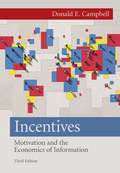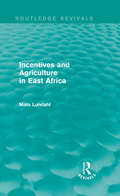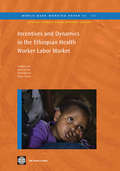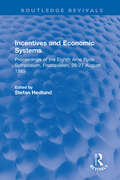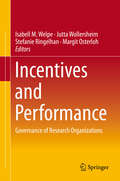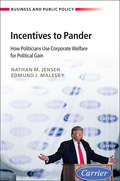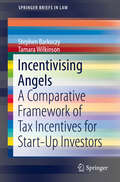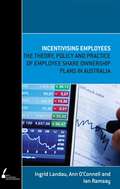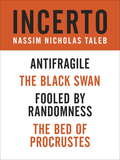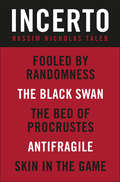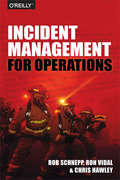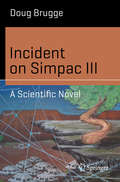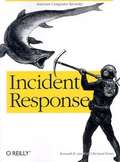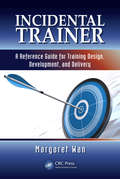- Table View
- List View
The Incentive for Legacy: Tsinghua University Education Foundation
by Hao Gao Lauren Cohen Spencer C. N. HagistVivian Yuan seeks to bolster the Tsinghua University Education Foundation's fundraising efforts and investment goals in a new era of Chinese higher education. Competing with elite members of China's C9 League of top universities, she must develop a set of incentives and deliverables for alumni and non-affiliated donors which can bridge the gaps in their own investment and philanthropic prospects. To do so, she must specify what makes the university unique as a donation opportunity, and highlight the things TUEF can accomplish that no one else can.
Incentive Pay for Portfolio Managers at Harvard Management Co.
by Brian J. Hall Jonathan P. LimThis case describes the compensation system for portfolio managers at Harvard's portfolio management company, including its formulaic and bonus bank features. Harvard Management Co. President Jack Meyer explains the philosophy behind the incentive pay at his company.
Incentive Strategy Within Organizations
by Brian J. HallThis case serves as a supplement to any course on incentive design and implementation. The analysis first locates incentive strategy within the larger structure of organizations and markets and then helps to define the central components and difficulties of incentive design. The case focuses on the principal difficulties in implementing incentive systems, including the trade off between objective and subjective performance metrics, how to design incentive systems in team environments, and the inherent problems with designing incentive systems in environments where workers are involved in multiple activities.
Incentive Systems
by Brian J. HallThis note serves as a supplement to any course on incentive design within organizations. The note focuses on the principal difficulties in designing incentive systems, including the trade off between objective and subjective performance metrics, how to design incentive systems in team environments, and the inherent problems with designing incentive systems in environments where workers are involved in multiple activities.
Incentives (3rd Edition): Motivation and the Economics of Information
by Donald E. CampbellWhen incentives work well, individuals prosper. When incentives are poor, the pursuit of self-interest is self-defeating. This book is wholly devoted to the topical subject of incentives from individual, collective, and institutional standpoints. <P><P>This third edition is fully updated and expanded, including a new section on the 2007–08 financial crisis and a new chapter on networks as well as specific applications of school placement for students, search engine ad auctions, pollution permits, and more. Using worked examples and lucid general theory in its analysis, and seasoned with references to current and past events, Incentives: Motivation and the Economics of Information examines: the performance of agents hired to carry out specific tasks, from taxi drivers to CEOs; the performance of institutions, from voting schemes to medical panels deciding who gets kidney transplants; a wide range of market transactions, from auctions to labor markets to the entire economy. Suitable for advanced undergraduate and graduate students studying incentives as part of courses in microeconomics, economic theory, managerial economics, political economy, and related areas of social science.
Incentives and Agriculture in East Africa (Routledge Revivals)
by Mats LundahlAgriculture is at the centre of the economies of many developing countries, and its stagnation and poor performance across large parts of Africa is a major cause for concern. First published in 1990, this book focuses on the nature and role of incentives in agricultural organization and production in East Africa, looking in particular at the political and ideological determinants of that role. Mats Lundahl analyses ways of improving agricultural performance, and considers the ‘African socialism’ of Julius Nyerere in contrast with the market-led approaches, which he favours. A detailed title, this volume will of interest to all those concerned with the issues of rural development, including students of development studies, economics, and African studies.
Incentives and Dynamics in the Ethiopian Health Worker Labor Market
by William Jack Joost De Laat Agnes Soucat Kara HansonBy international standards, health workers in Ethiopia are in short supply. In addition, those who do enter the health fields and remain in the country disproportionately live and work in the capital, Addis Ababa. This paper uses detailed data gathered from nearly 1,000 health workers to examine the incentives and constraints that health workers face when choosing where to work, the likely responses of workers to alternative incentive packages, and the longer term performance of the health worker labor market. This working paper was produced as part of the World Bank's Africa Region Health Systems for Outcomes (HSO) Program. The Program, funded by the World Bank, the Government of Norway, the Government of the United Kingdom and the Global Alliance for Vaccines and Immunization (GAVI), focuses on strengthening health systems in Africa to reach the poor and achieve tangible results related to Health, Nutrition and Population. The main pillars and focus of the program center on knowledge and capacity building related to Human Resources for Health, Health Financing, Pharmaceuticals, Governance and Service Delivery, and Infrastructure and ICT.
Incentives and Economic Systems: Proceedings of the Eighth Arne Ryde Symposium, Frostavallen, 26-27 August 1985 (Routledge Revivals)
by Stefan HedlundFirst published in 1987, Incentives and Economic Systems is a selection of papers presented at the Eighth Arne Ryde Symposium at Frostavallen, Sweden on how institutions attempt to guide individual behaviour by manipulating the social and economic incentive system. These economic and social aspects of incentives determine ‘rational’ and ‘irrational’ behaviour by individuals and organizations across various economic systems. The essays in the volume deal with various aspects of the incentive problems and the various manifestations of such problems, along with moral and ethical issues. The essays will be an enlightening read for students of economics, policymaking and international politics.
Incentives and Institutions: The Transition to a Market Economy in Russia
by Serguey Braguinsky Grigory YavlinskyHere, for the first time, two of Russia's leading economists provide an authoritative analysis of the transition to a democratic market economy that has taken place in Russia since 1990. Serguey Braguinsky, a Russian economist with extensive international experience, and Grigory Yavlinsky, leader of the liberal "Yabloko" party and a major public figure in Russia, focus on the institutions that are critical to a successful transition and the economic incentives needed to make these institutions work. Finally, they discuss in detail the specific components of the economic processes that are necessary for economic transition in general and they draw lessons that can be applied to other nations dealing with similar transitions. In 1989, Grigory Yavlinsky became a member of the Commission for Economic Reform and wrote the groundbreaking "500 Day Plan," which outlined the first program of transition to a market economy. Two years later, he co-wrote the program of strategic cooperation between the Soviet government and the West (known as the "Grand Bargain"). Here he and Serguey Braguinsky examine what went wrong with the Russian plan--and what is needed to put the economy back on the road to becoming a fully functioning market economy. The first section of the book presents a new interpretation of the political economy of the socialist state and the incentives and institutions that underpin it, with an emphasis on the present Russian situation. The second part deals with the political economy of "spontaneous transition" and the inefficiencies inherent in economies that lack the organizations and institutions that inhere in established Western democratic economies. In the final section, the authors present a program of actions to put the economic transition in Russia back on track, based on their assessment of the actual current state of both the economy and the government. Their approach is unique in emphasizing organizational evolution at the microeconomic level instead of stressing macroeconomic issues such as money and inflation that are at the heart of most arguments. This is a thoughtful and thought-provoking book and one that will be widely discussed and debated.
Incentives and Performance
by Isabell M. Welpe Jutta Wollersheim Stefanie Ringelhan Margit OsterlohThis book contributes to the current discussion in society, politics and higher education on innovation capacity and the financial and non-financial incentives for researchers. The expert contributions in the book deal with implementation of incentive systems at higher education institutions in order to foster innovation. On the other hand, the book also discusses the extent to which governance structures from economy can be transferred to universities and how scientific performance can be measured and evaluated. This book is essential for decision-makers in knowledge-intensive organizations and higher-educational institutions dealing with the topic of performance management.
Incentives at the Bangladesh Rural Advancement Committee (BRAC)
by Nava Ashraf Kristin JohnsonIndustry and Background Note
Incentives for Innovation in China: Building an Innovative Economy (Routledge Contemporary China Series)
by Jun Li Xuedong DingIn the past three decades, China has successfully transformed itself from an extremely poor economy to the world’s second largest economy. The country’s phenomenal economic growth has been sustained primarily by its rapid and continuous industrialization. Currently industry accounts for nearly two-fifths of China’s gross domestic product, and since 2009 China has been the world’s largest exporter of manufactured products. This book explores the question of how far this industrial growth has been the product of government policies. It discusses how government policies and their priorities have developed and evolved, examines how industrial policies are linked to policies in other areas, such as trade, technology and regional development, and assesses how new policy initiatives are encouraging China’s increasing success in new technology-intensive industries. It also demonstrates how China’s industrial policies are linked to development of industrial clusters and regions.
Incentives in the NFL (Abridged)
by Brian J. Hall Andrew Wasynczuk Jonathan P. Lim Sara Del Nido Katherine DowdIndustry and Background Note
Incentives to Pander: How Politicians Use Corporate Welfare for Political Gain (Business and Public Policy)
by Nathan M. Jensen Edmund MaleskyPolicies targeting individual companies for economic development incentives, such as tax holidays and abatements, are generally seen as inefficient, economically costly, and distortionary. Despite this evidence, politicians still choose to use these policies to claim credit for attracting investment. Thus, while fiscal incentives are economically inefficient, they pose an effective pandering strategy for politicians. <P><P>Using original surveys of voters in the United States, Canada and the United Kingdom as well as data on incentive use by politicians in the US, Vietnam and Russia, this book provides compelling evidence for the use of fiscal incentives for political gain and shows how such pandering appears to be associated with growing economic inequality. As national and subnational governments surrender valuable tax revenue to attract businesses in the vain hope of long-term economic growth, they are left with fiscal shortfalls that have been filled through regressive sales taxes, police fines and penalties, and cuts to public education.<P> Provides rigorous empirical analysis, involving cutting-edge methods including: survey and natural experiments, regression discontinuity designs, and matching estimators. These techniques will give sophisticated readers confidence in the argument and policy conclusions; Includes a chapter on comparative incentive programs and an analysis of Vietnam and Russia that broadens the reach of the study beyond western democracies to authoritarian political systems.<P> Vivid description and unique presentation of the analysis will benefit readers familiar with well-known case studies such as Ferguson Electric, Google in Lenoir North Carolina, and the Kansas City border wars.<P>
Incentives Within Organizations
by Brian J. HallServes as a brief introduction to incentive design and implementation. The analysis first locates incentive strategy within the larger structure of organizations and markets and then helps to define the central components and difficulties of incentive design. Focuses on the principal difficulties in implementing incentive systems, including the tradeoff between objective and subjective performance metrics, how to design incentive systems in team environments, and the inherent problems with designing incentive systems in environments where workers are involved in multiple activities. A rewritten version of an earlier note.
Incentivising Angels: A Comparative Framework of Tax Incentives for Start-Up Investors (SpringerBriefs in Law)
by Stephen Barkoczy Tamara WilkinsonThis book examines tax incentives for investors in start-up companies through a critical analysis of Australia’s early-stage investors (ESI) program, and a comparison of that program with the United Kingdom’s Seed Enterprise Investment Scheme (SEIS) upon which it is loosely modelled. It discusses the importance of innovation and the special role that venture capital plays in supporting start-ups, and explains the policy rationale for introducing the ESI program as well as dissecting its technical requirements in detail. Special attention is devoted to the program’s ‘early stage’ and ‘innovation’ requirements, which are crucial for determining whether a start-up qualifies for the tax incentives. The book is the first in-depth scholarly legal analysis of the ESI program and the first occasion it has been compared and contrasted with a foreign program. The comparative discussion of the ESI program with the SEIS program enables the authors to make suggestions for reforms to the ESI program so that it can better achieve its policy objectives. The fact that the book includes reform suggestions makes it particularly interesting for policy makers. It is also of broad relevance to legal and finance scholars and students as well as entrepreneurs, angels, venture capitalists and their advisors.
Incentivising Employees: The theory, policy and practice of employee share ownership plans in Australia
by Ingrid Landau Ann O'Connell Ian RamsayEmployee share ownership has the potential to generate a culture of enterprise and innovation, and build national wealth and savings. This book is the culmination of a multi-year research project funded by the Australian Research Council and represents the first detailed discussion of the theory, policy and practice of employee share ownership plans (ESOPs) in Australia. The topics examined in the book are key legal and policy issues relevant to ESOPs, the current incidence and forms of ESOPs in Australia, the corporate law and taxation law frameworks, why employers implement ESOPs and why employees participate in them, international comparisons, and recommendations for reform.
Incentivized Development in China
by Bulman David J.China's economy, as a whole, has developed rapidly over the past 35 years, and yet its richest county is over 100 times richer in per capita terms than its poorest county. To explain this vast variation in development, David J. Bulman investigates the political foundations of local economic growth in China, focusing on the institutional and economic roles of county-level leaders and the career incentives that shape their behaviour. Through a close examination of six counties complemented by unique nation-wide data, he presents and explores two related questions: what is the role of County Party Secretaries in determining local governance and growth outcomes? And why do County Party Secretaries emphasize particular developmental priorities? Suitable for scholars of political economy, development economics, and comparative politics, this original study analyzes the relationship between political institutions, local governance, and leadership roles within Chinese government to explain the growing divergence in economic development between counties.
Incept LLC and Confluent Surgical (A)
by Bhaskar Chakravorti Toby Stuart James WeberA venture capitalist must decide whether to invest in a medical technology company that licenses intellectual property from a privately held IP holding company based on a platform technology. Entrepreneurs Amar Sawhney and Fred Khosravi founded Incept LLC to commercialize their multi-use hydrogel technology. The pair then spun off Confluent Surgical to develop some, but not all, of Incept's IP. The specifics of which IP Confluent would develop were described by a licensing agreement between Incept and Confluent. Venture capitalist Charles Warden of Schroder Ventures Life Sciences was deciding whether to invest in a Series A financing round in Confluent. Initially very excited about the deal, Warden becomes concerned about Confluent's valuation and its ability to succeed as a business when he learns about restrictions placed upon Confluent by the licensing agreement. The case describes Incept's business model and its approach to managing risk in early stage ventures. The case also addresses issues such as diversification and options preservation as well as the importance of trust and long-term relationships in decision-making in entrepreneurial arenas.
Incerto 4-Book Bundle: Fooled by Randomness, The Black Swan, The Bed of Procrustes, Antifragile (Incerto)
by Nassim Nicholas TalebNassim Nicholas Taleb's landmark Incerto series is an investigation of luck, uncertainty, probability, opacity, human error, risk, disorder, and decision-making in a world we don't understand, in nonoverlapping and standalone books. All four volumes--Antifragile, The Black Swan, Fooled by Randomness, and the special expanded edition of The Bed of Procrustes, updated with more than 50 percent new material--are now together in one ebook bundle. ANTIFRAGILE "Startling . . . richly crammed with insights, stories, fine phrases and intriguing asides."--The Wall Street Journal Just as human bones get stronger when subjected to stress and tension, many things in life benefit from disorder, volatility, and turmoil. What Taleb has identified and calls "antifragile" is that category of things that not only gain from chaos but need it in order to survive and flourish. The resilient resists shocks and stays the same; the antifragile gets better and better. What is crucial is that the antifragile loves errors, as it incurs small harm and large benefits from them. Spanning politics, urban planning, war, personal finance, economic systems, and medicine in an interdisciplinary and erudite style, Antifragile is a blueprint for living in a Black Swan world. THE BLACK SWAN "The Black Swan changed my view of how the world works."--Daniel Kahneman, Nobel laureate A black swan is a highly improbable event with three principal characteristics: It is unpredictable; it carries a massive impact; and, after the fact, we concoct an explanation that makes it appear less random and more predictable. The astonishing success of Google was a black swan; so was 9/11. In this groundbreaking and prophetic book, Taleb shows that black swan events underlie almost everything about our world, from the rise of religions to events in our own personal lives, and yet we--especially the experts--are blind to them. FOOLED BY RANDOMNESS "[Fooled by Randomness] is to conventional Wall Street wisdom approximately what Martin Luther's ninety-five theses were to the Catholic Church."--Malcolm Gladwell, The New Yorker Are we capable of distinguishing the fortunate charlatan from the genuine visionary? Must we always try to uncover nonexistent messages in random events? Fooled by Randomness is about luck: more precisely, about how we perceive luck in our personal and professional experiences. Set against the backdrop of the most conspicuous forum in which luck is mistaken for skill--the markets--Fooled by Randomness is an irreverent, eye-opening, and endlessly entertaining exploration of one of the least understood forces in our lives. THE BED OF PROCRUSTES "Taleb's crystalline nuggets of thought stand alone like esoteric poems."--Financial Times This collection of aphorisms and meditations expresses Taleb's major ideas in ways you least expect. The Bed of Procrustes takes its title from Greek mythology: the story of a man who made his visitors fit his bed to perfection by either stretching them or cutting their limbs. With a rare combination of pointed wit and potent wisdom, Taleb plows through human illusions, contrasting the classical views of courage, elegance, and erudition against the modern diseases of nerdiness, philistinism, and phoniness.
Incerto 5-Book Bundle: Fooled by Randomness, The Black Swan, The Bed of Procrustes, Antifragile, Skin in the Game (Incerto)
by Nassim Nicholas TalebThe landmark five-book series—all together in one ebook bundleThe Incerto is an investigation of opacity, luck, uncertainty, probability, human error, risk, and decision making when we don&’t understand the world, expressed in the form of a personal essay with autobiographical sections, stories, parables, and philosophical, historical, and scientific discussions, in non-overlapping volumes that can be accessed in any order. The main thread is that while there is inordinate uncertainty about what is going on, there is great certainty as to what one should do about it.This ebook bundle includes:FOOLED BY RANDOMNESSTHE BLACK SWANTHE BED OF PROCRUSTESANTIFRAGILESKIN IN THE GAME
Incident Management for Operations
by Rob Schnepp Ron Vidal Chris HawleyAre you satisfied with the way your company responds to IT incidents? How prepared is your response team to handle critical, time-sensitive events such as service disruptions and security breaches? IT professionals looking for effective response models have successfully adopted the Incident Management System (IMS) used by firefighters throughout the US. This practical book shows you how to apply the same response methodology to your own IT operation.You’ll learn how IMS best practices for leading people and managing time apply directly to IT incidents where the stakes are high and outcomes are uncertain. This book provides use cases of some of the largest (and smallest) IT operations teams in the world. There is a better way to respond. You just found it.Assess your IT incident response with the PROCESS programmatic evaluation toolGet an overview of the IMS all-hazard, all-risk frameworkUnderstand the responsibilities of the Incident CommanderForm a unified command structure for events that affect multiple business unitsSystematically evaluate what broke and how the incident team responded
Incident on Simpac III: A Scientific Novel (Science and Fiction)
by Doug BruggeA few hundred years into the future, a wave of space colonization follows a disastrous earlier attempt to inhabit nearby extrasolar planets. It is guided by a new computational method based on massive data-driven socio-cultural and socio-epidemiological modeling and using novel biological computers, fed with data on Earth’s history of successes and failures. Yet, in the newly settled Simpac system, some unexpected and worrying anomalies begin cropping up, making an urgent expedition to the system necessary: is it the underlying data, the computations, or is some unknown entity tampering with the space colonization program? A race against time ensues as the lives of four strangers begin to converge. While grounded in the social systems aspect, the author posits that the future is likely to be characterized by more biology-based tools than most contemporary science fiction – which most often relies entirely on non-biological hardware in terms of advanced technologies – predicts. The result is an entertaining and skillful blend of thriller and SF, complemented by a nontechnical appendix describing the underlying science.
Incident Response
by Richard Forno Kenneth R. van WykAre you ready for a computer "incident," such as a security breach? Incident Responseshows you both the technical and administrative aspects of building an effective incident response plan. You'll learn about the different types of incidents and ways to respond to them, how to put together an incident response team, what procedures to use, what tools there are for investigating incidents, and where to find extensive online resources.
Incidental Trainer: A Reference Guide for Training Design, Development, and Delivery
by Margaret Wan"We have trained and trained. The employees still don't get it!" Although a critical component in improving organizational performance, training is usually not conducted effectively and results in a waste of resources. Often, subject-matter experts are given training responsibilities because of their technical expertise; however, just as often, the

